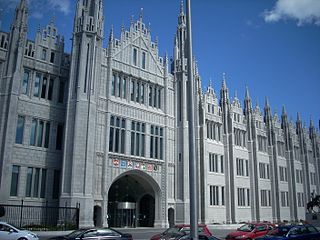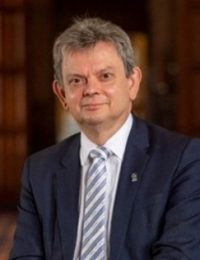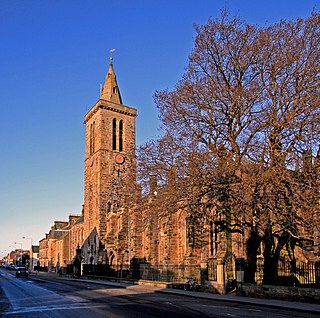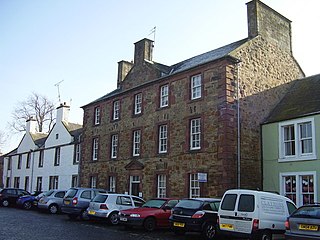Sir Donald Neil MacCormick was a Scottish legal philosopher and politician. He was Regius Professor of Public Law and the Law of Nature and Nations at the University of Edinburgh from 1972 until 2008. He was a Member of the European Parliament 1999–2004, member of the Convention on the Future of Europe, and officer of the Scottish National Party.

Scottish national identity is a term referring to the sense of national identity, as embodied in the shared and characteristic culture, languages and traditions, of the Scottish people.
Thomas Cunningham Nairn was a Scottish political theorist and academic. He was an Honorary Research Fellow in the School of Government and International Affairs at Durham University. He was known as an essayist and a supporter of Scottish independence.

Sir Vernon Bernard Bogdanor is a British political scientist, historian, and research professor at the Institute for Contemporary British History at King's College London. He is also emeritus professor of politics and government at the University of Oxford and an emeritus fellow of Brasenose College, Oxford.
Sir Kenneth Charles Calman, HonFAcadMEd is a Scottish doctor and academic who formerly worked as a surgeon, oncologist and cancer researcher and held the position of Chief Medical Officer of Scotland, and then England. He was Warden and Vice-Chancellor of Durham University from 1998 to 2006 before becoming Chancellor of the University of Glasgow. He held the position of Chair of the National Cancer Research Institute from 2008 until 2011. From 2008 to 2009, he was convener of the Calman Commission on Scottish devolution.

There are fifteen universities in Scotland and three other institutions of higher education that have the authority to award academic degrees.

John Pitcairn Mackintosh was a Scottish academic, author and Labour politician known for his advocacy of political devolution, at a time when it was anathema to the Labour leadership, and for his pro-Europeanism. He advanced the concept of dual nationality: that Scots could be both Scottish and British, and indeed European. He was the Member of Parliament (MP) for Berwick and East Lothian from 1966 to February 1974 and again from October 1974 until his death.
Civic nationalism, also known as democratic nationalism and liberal nationalism, is a form of nationalism that adheres to traditional liberal values of freedom, tolerance, equality, individual rights and is not based on ethnocentrism. Civic nationalists often defend the value of national identity by saying that individuals need it as a partial shared aspect of their identity in order to lead meaningful, autonomous lives and that democratic polities need national identity to function properly.
Sir David Alexander Ogilvy Edward is a Scottish lawyer and academic, and former Judge of the Court of Justice of the European Communities. Sir David is an Honorary Fellow of University College, Oxford; Honorary Professor of the University of Edinburgh and Fellow of the Royal Society of Edinburgh. He is also an Honorary Sheriff of the Sheriffdom of Tayside, Central and Fife at Perth, Scotland.
John Loughlin is a British-based academic and educator from Northern Ireland, and a noted specialist in European territorial politics.

Richard Rose is an American political scientist who has been a professor of politics in Scotland since 1966. His research has included the Northern Ireland conflict, enlargement of the European Union, democratisation, policy transfer, elections and voting.

Sir Vito Antonio Muscatelli is the Principal of the University of Glasgow and one of the United Kingdom's top economists.

Adam Tomkins is a British academic and politician who is the John Millar Professor of Public Law at the University of Glasgow School of Law. A member of the Scottish Conservatives, he was a Member of the Scottish Parliament (MSP) for the Glasgow region from 2016 to 2021, when he stood down for that year's elections.

Sir John Kevin Curtice is a British political scientist who is currently professor of politics at the University of Strathclyde and senior research fellow at the National Centre for Social Research. He is particularly interested in electoral behaviour and researching political and social attitudes. He took a keen interest in the debate about Scottish independence.

Sir Ian David Diamond is a British statistician, academic, and administrator, who served as Principal and Vice-Chancellor of the University of Aberdeen until 2018. He became the UK's National Statistician in October 2019.

The history of universities in Scotland includes the development of all universities and university colleges in Scotland, between their foundation between the fifteenth century and the present day. Until the fifteenth century, those Scots who wished to attend university had to travel to England, or to the Continent. This situation was transformed by the founding of St John's College, St Andrews in 1418 by Henry Wardlaw, bishop of St. Andrews. St Salvator's College was added to St. Andrews in 1450. The other great bishoprics followed, with the University of Glasgow being founded in 1451 and King's College, Aberdeen in 1495. Initially, these institutions were designed for the training of clerics, but they would increasingly be used by laymen. International contacts helped integrate Scotland into a wider European scholarly world and would be one of the most important ways in which the new ideas of humanism were brought into Scottish intellectual life in the sixteenth century.

Scottish education in the eighteenth century concerns all forms of education, including schools, universities and informal instruction, in Scotland in the eighteenth century.
Charlie Jeffery is the Vice Chancellor and President of University of York, UK.
Nicola McEwen, FRSE is professor of territorial politics at the University of Edinburgh, co-director of the Centre on Constitutional Change, and senior fellow at the UK in a Changing Europe. She became a Fellow of the Royal Society of Edinburgh in 2021. She leads research on devolution and inter-institutional relations. She provides advice to governments and public bodies and gives media expert perspectives internationally. McEwen's research and insights are sought for public engagement and political or business briefings during major events like the 2014 Scottish Independence Referendum, and the Smith Commission, UK BREXIT and recent elections such as to the Scottish Parliament. She has a reputation for being authoritative and trustworthy in engaging with senior politicians, civil service and civic society and has regular media engagements on various topics. McEwen is consulted on aspects such as potential impact on welfare of Scottish independence, or informing parliament on the impact of BREXIT on intra-UK relations and communicating her findings and explanations to public media.
Angus Mcintosh, was a British linguist and academic, specialising in historical linguistics.











